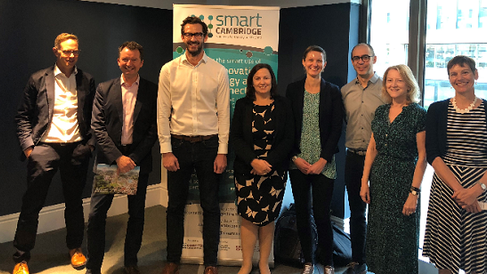
The first autumn CSIC Digital Cities for Change (DC2) seminar considered ‘Technologies and Strategies of 'coping'’ and featured two guest speakers who presented diverse topics of research. The seminar took place at the new Civil Engineering building on the West Cambridge site on 1 October.
Funded by the Ove Arup Foundation and the Centre for Digital Built Britain (CDBB), DC2 evaluates both existing structures and systems of city and infrastructure management, and investigates how digital tools can help better decision-making within these areas.
Juan S. Canavera Herrera is a PhD student in the Future Infrastructure and Built Environment Centre for Doctoral Training of the Engineering Department. Juan’s research focuses on urban resilience and adaptation of urban infrastructure to climate change. His presentation to the DC2 audience set out a conceptual framework called the Expanded Adaptation Action Cycles (EAAC) developed as part of his research.
The framework provides an overview of how a city might go through an adaptation planning process which can be applied as a diagnostic tool to understand where a city is in relation to this cycle, reveal what adaptation paths might be available and identify both barriers and opportunities to specific pathways. Considering decision-making in the context of climate change, Juan introduced a case study carried out in Bogota, Colombia, where the management of the road network is extremely fragmented – there are 23 different organisations within the road sector – leading to gaps in responsibility for maintenance and upkeep. He spoke about additional challenges including a poor understanding of future effects of climate change on the network and a lack of quality infrastructure in some parts of the city. Despite a lack of understanding of the concept of adaptation by road network stakeholders in Bogota, Juan claimed adaptation is becoming more important “as climate change is unavoidable”. Projecting a photograph of an avenue in Bogota lined with houses, showing the road completely under water, Juan described the image as an increasingly common scene in the capital. He said: “This is not an event from the future, it is something that is happening now and we have to act.”
Matt Mahmoudi is a Jo Cox Scholar and PhD student at the Centre of Development Studies, University of Cambridge. His research focuses on technological marginalisation amongst refugees and asylum seekers and examines the justice implications of new digital boundaries to socioeconomic life in cities in an era of ‘datafied refuge’, in which the process of refuge from home country and throughout the process of movement into camps and beyond into cities where people are resettled is datafied.
Matt’s talk highlighted his recent research based in New York City and Berlin investigating urban digital ‘integration’ strategies targeted at immigrant populations in particular. A growing consensus between technology actors, states and institution to share in mobility governance between and within borders is transforming the lives of refugees. He said: “I look at justice implications of the technology of migration and ask if modern technology designed for refugee integration reinforces marginality.”
Acknowledging research work focusing on border control – and specifically biometric technologies deployed for border control – Matt said: “What we haven’t looked at as much are the mundane ways in which technologies are used to give people access to housing and work, to social services and connectivity within the context of the city and in what ways they are also an extension of the regime of migration control.”
Dr Timea Nochta, a Research Associate in Urban Systems and Infrastructure at CSIC developing data-driven solutions to improve decision-making in asset, city and infrastructure planning and management, is part of the core DC2 and led the seminar and discussion. She said: “Adaptation to the impacts of climate change is both a global and a local issue. It is crucial to ensure that the responses developed are not only efficient but also just. The talks have explored these themes from different disciplinary and methodological perspectives, leading to an engaging and lively discussion among participants. This is the goal of the DC2 seminars – to bring together researchers from different backgrounds and facilitate constructive cross-disciplinary debate leading to better research and solutions. The seminar series continues on 28th October.”
Smart Cambridge
Researchers from CSIC’s DC2 team also presented at an event held in Cambridge earlier this month showcasing the use of smart solutions to tackle city challenges in Greater Cambridge. Supported by the Greater Cambridge Partnership, the Smart Cambridge programme works collaboratively with a range of technology partners to transform the way people live, work and travel in and around the city. Cambridge is one of the fastest-growing cities in the UK, and while being a successful city offers many opportunities, it also brings significant challenges including congestion and air pollution.
Dr Timea Nochta (photographed above, fourth from the right) and Dr Li Wan presented the DC2 project with Smart Cambridge to develop a digital twin prototype to delegates, explaining how utilising data and the latest technologies can improve quality of life, sustainability and the economic strength of the area. Dr Nochta said: “With the help of Smart Cambridge we have worked with Cambridgeshire County Council officers to help us understand local requirements and how we can deliver a city-scale digital twin prototype which responds to imminent city challenges and supports the policy goals of improving air quality and reducing congestion. We will continue to develop it alongside the Council so that it can be used to its full potential.”
